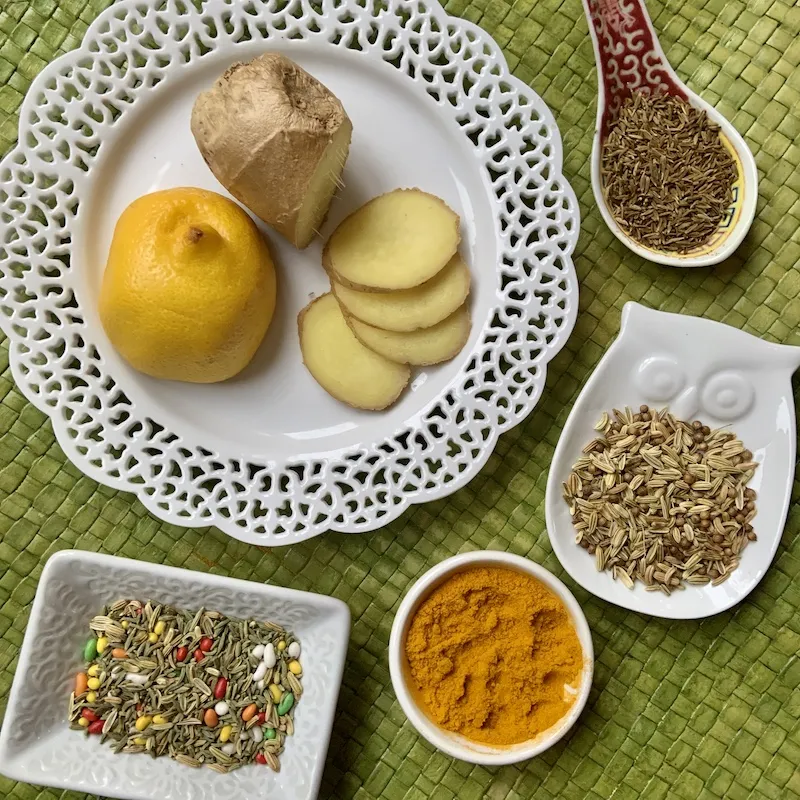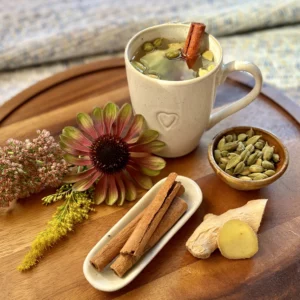The study of Herbal Therapeutics is integral to a meaningful practice of Ayurvedic Healing.
We often think of herbs while we are in our kitchen. And though there is no doubt that herbs enhance the flavours of our food, they are also profoundly nourishing and healing.
Herbs are steeped in lore and have long played a role in magic and healing throughout history.
The magic of herbs and the reason they work lies in the very special properties they possess. As the foods we eat build the body, herbals work on a more subtle level to energize, purify and heal. This is what has made them an integral part of natural or holistic healing since the beginning of time.

So, how does Herbal Medicine work?
Ayurveda shares how herbs are strong in life force energy (prana) as the essence of the plant. They possess subtle energies which are then carried into our body as we ingest them and commune with them. Through this sacred relationship and alchemy of subtle energies, herbs become therapeutic.
“Plants bring us the love, the nourishing power of the sun, which is the same energy of all the stars, of all light. These cosmic energies emanated by plants thus nourish, sustain and make grow our own astral body.” (The Yoga of Herbs by Dr, David Frawley and Dr. Vasant Lad)
As diverse as herbs are in taste, so too are they diverse in their therapeutic actions. Just as you can choose basil, oregano or a bay leaf for your spaghetti sauce instead of cinnamon, so too can you choose herbs for their particular healing and nourishing power. As there are celebrated herbal combinations in cooking, so too are there time-tested herbal combinations for wellness and immunity.
Let’s take a look…
Ayurvedic Herbal Therapeutics
Based on their energetics, herbs have various therapeutic effects and have been classified according to their pranic actions. The following is a list of herbal types and their related actions;
➤ Alterative Herbs
Purify the blood, cleanse the lymphatics, remove toxins
COMMON HERBS: dandelion, nettle, hibiscus, aloe vera, burdock, cinnamon, coriander, cumin, plantain, turmeric
Ayurvedic herbs; manjishta, neem, sandalwood
➤ Antiparasitical Herbs
Destroy or dispel parasites, bacterial, fungal and yeast infections
COMMON HERBS: cayenne pepper, cloves, garlic, thyme
Ayurvedic Herbs; ajwain, asafoetida
➤ Astringent Herbs
Stop bleeding, stop diarrhea, promote the healing of tissues
COMMON HERBS: nettle, plantain, hibiscus, red raspberry, saffron
Ayurvedic herbs: manjishta haritaki
➤ Bitter Tonic and Antipyretic Herbs
Reduce fever, cleanse the body, kill toxins, regulate liver function
COMMON HERBS: aloe vera, barberry, gentian
Ayurvedic herbs: neem
➤ Carminative Herbs
Relieve intestinal gas, pain and distention, settle digestion, dispel water and mucus
COMMON HERBS: ginger, peppermint, spearmint, basil, lavender, cardamom, cinnamon, coriander, cumin, dill, fennel, rosemary
Ayurvedic herbs: ajwain, asafoetida
➤ Diaphoretic Herbs
Stimulating, induce perspiration, dispel fever and chills, eliminate toxins
COMMON HERBS: peppermint, basil, ginger, turmeric, cardamom, cinnamon, cloves, coriander, eucalyptus, rosemary, spearmint
Ayurvedic herbs: camphor, tulsi
➤ Diuretic Herbs
Increase urination, promote the activity of the kidneys and bladder, dispel edema
COMMON HERBS: asparagus, barley, burdock, coriander, dandelion, fennel, lavender, parsley, spearmint
Ayurvedic herbs: ajwain, gokshura, punarnava
➤ Emmenagogues
promote and regulate menstruation
COMMON HERBS: hibiscus, jasmine, rose, aloe vera, licorice, rosemary, saffron
Ayurvedic herbs: shatavari
➤ Expectorant Herbs
Promote the discharge of phlegm and mucus from the body
COMMON HERBS: cardamom, cinnamon, dry ginger, mustard seed. licorice
Ayurvedic herbs: pippali
➤ Demulcent Herbs
Moistening, softening and soothing effect upon the skin and mucous membranes
COMMON HERBS: licorice, comfrey root, flax seed
Ayurvedic herbs: bala, shatavari
➤ Laxative and Purgative Herbs
Promote bowel movements, dispel constipation, eliminate food accumulations
COMMON HERBS: aloe vera, dandelion, rhubarb, senna, castor bean
Ayurvedic herbs: bibhitaki, haritaki, shatavari
➤ Nervine and Antispasmodic Herbs
Strengthen the function of the nervous system, relieve spasms, cramps, tremors
COMMON HERBS: basil, chamomile, eucalyptus, nutmeg, peppermint, sage, skullcap
Ayurvedic herbs: asafoetida, guggulu, jatamamsi, sandalwood
➤ Stimulant and Digestive Herbs
Stimulate the power of digestion
COMMON HERBS: ginger, black pepper, cayenne pepper, cinnamon, cloves, mustard
Ayurvedic herbs: ajwain, asafoetida, pippali
➤ Nutritive or Rejuvenative Herbs
Nourishing, restorative, renewing
COMMON HERBS: licorice, aloe vera, ginseng, marshmallow, saffron
Ayurvedic herbs; amalaki, ashwagandha, pippali, shatavari, triphala
Through Ayurvedic Consultations and Wellness Coaching you can learn more about which herbs are ideal for your personal constitution and current state of imbalance to help meet your health and immunity goals.
Ayurvedic Herbals to Cleanse and Heal
With an awareness of the particular therapeutic qualities of an herb and their related actions, we gain deeper insight into how herbs can be powerful allies to help us cleanse, protect and heal. They are indeed the stuff of magic!
Look beyond your just kitchen to see how easily the wisdom, healing and delight of herbs can be integrated into your everyday life! Learn more about the power of herbal therapeutics through practical experience via Ayurv Ayurvedic Spring Cleanse or Ayurvedic Liver Cleanse.
For a more extended study of this fascinating topic review Herbal Therapeutics in the book The Yoga of Herbs by Dr. David Frawley and Dr. Vasant Lad!
Reference: Yoga of Herbs. Dr. David Frawley and Dr. Vasant Lad
Herb Club ➤ Deepen your relationships with common herbals (nettles, dandelion, lavender, mint, hibiscus and ginger) through recipes, tea blends, experiential and artistic explorations.
Strengthen your understanding of Herbal Therapeutics through the delight of Making Your Own Herbal Oils ➤



